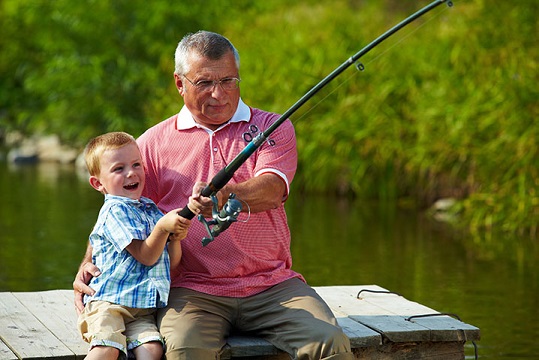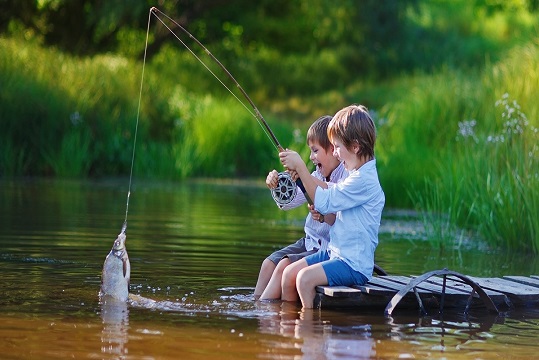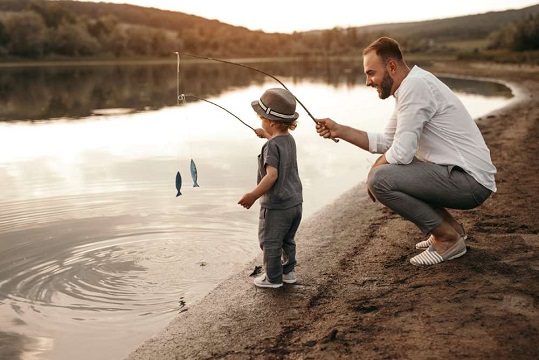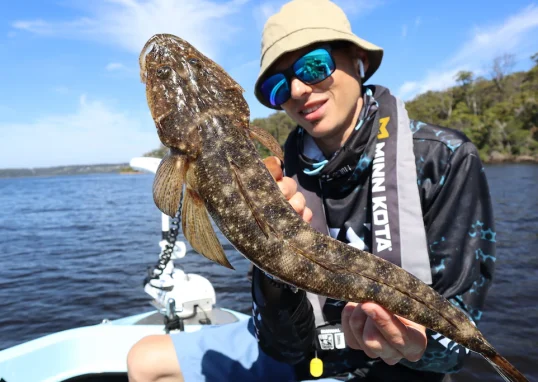
Fishing is often seen as a leisurely pastime, but for children, it offers much more than just a way to pass the time. It’s a fun, engaging, and educational activity that can play a significant role in their development. Whether they’re casting a line at a local pond, spending a day on a boat, or simply enjoying the quiet of nature, fishing provides kids with a range of benefits that extend far beyond the immediate thrill of catching a fish.

1. Enhances Focus and Patience
In today’s world, where instant gratification is the norm, fishing teaches children the value of patience. Waiting for a fish to bite requires stillness and concentration, skills that are increasingly rare among younger generations accustomed to the rapid pace of digital entertainment. Through fishing, kids learn to slow down, observe their surroundings, and appreciate the process rather than just the outcome.
Fishing is not always about catching a fish right away; it often involves waiting for the right moment, which can take time. This waiting period teaches kids that some things are worth the wait and that good things come to those who are patient. It’s a valuable life lesson that can help them in various aspects of their personal and academic lives, where patience and persistence are often required.
2. Builds Motor Skills and Coordination
Fishing involves a range of physical activities, from casting the line to reeling in the catch. These actions help children develop fine motor skills and hand-eye coordination. Learning to handle the fishing rod, adjusting the reel, and maneuvering the bait are all tasks that require precision and control.
These skills are not only applicable to fishing but are also transferable to other activities and sports. The act of casting, for instance, involves a coordinated effort of the arm, wrist, and fingers, all working together to place the bait in just the right spot. This kind of activity can help children improve their dexterity and overall coordination, skills that are useful in everything from writing to playing sports.
3. Boosts Confidence and Self-Esteem
There’s nothing quite like the feeling of reeling in a fish, especially for a child. The sense of accomplishment that comes from catching a fish, no matter the size, is a powerful confidence booster. It reinforces the idea that effort leads to results, which is an important lesson for kids as they grow and face various challenges in life.
Fishing also provides an opportunity for kids to set and achieve personal goals. Whether it’s aiming to catch their first fish, learning to tie their own knots, or mastering a new casting technique, each achievement adds to their sense of capability and self-worth. The more they succeed, the more confident they become in their abilities, not just in fishing, but in other areas of their lives as well.

4. Strengthens Family Bonds
Fishing is a wonderful way for families to spend quality time together. In an age where technology often distracts from face-to-face interactions, fishing offers a chance for parents, grandparents, and children to connect in a meaningful way. It’s an activity that allows for conversation, storytelling, and teaching moments that can create lasting memories.
Whether it’s passing down fishing techniques or simply enjoying the peacefulness of being together in nature, fishing creates a unique environment where families can connect on a deeper level. These shared experiences often become treasured memories that kids carry with them throughout their lives.
5. Promotes a Connection with Nature
One of the most valuable aspects of fishing is its ability to connect children with the natural world. Spending time outdoors, away from screens and artificial environments, gives kids a chance to experience the beauty and tranquility of nature. They learn about different fish species, aquatic plants, and the overall ecosystem, which fosters a deeper respect and appreciation for the environment.
This connection with nature is not just about learning; it’s also about instilling a sense of stewardship. Kids who fish are more likely to develop a conservation mindset, understanding the importance of preserving natural habitats and protecting wildlife.
6. Teaches Problem-Solving and Critical Thinking
Fishing is not just about casting a line and waiting; it involves a lot of strategic thinking and problem-solving. Kids learn to analyze their environment, decide where to cast their line, choose the right bait, and figure out the best techniques to use depending on the conditions. These decisions require critical thinking and adaptability, skills that are valuable in many areas of life.
For example, if the fish aren’t biting, kids have to figure out why. Is it the bait? The location? The time of day.This problem-solving process can boost their analytical skills and help them become more resourceful and resilient individuals.

7. Provides Stress Relief and Promotes Mental Well-Being
The calming effects of being near water and surrounded by nature can have a significant impact on a child’s mental well-being. Fishing offers a break from the pressures of daily life, school, and social media, providing a peaceful escape that can help reduce stress and anxiety. The repetitive actions of casting and reeling can be meditative, allowing kids to relax and clear their minds.
Moreover, the sense of accomplishment that comes from fishing can also boost a child’s mood and overall mental health. The joy of catching a fish, even a small one, can be incredibly rewarding and uplifting. Fishing offers a sense of purpose and fulfillment, which can contribute to a positive outlook on life.
8. Encourages Physical Activity and Healthy Lifestyles
Fishing is an outdoor activity that encourages children to be active and spend time in the fresh air. While it may not be as physically demanding as some sports, it still involves a good amount of movement, from walking along the shore to casting and reeling in the fish..
Additionally, fishing trips often involve hiking, exploring, and even swimming, depending on the location. These activities promote cardiovascular health, improve endurance, and contribute to a healthy lifestyle. By associating exercise with fun and adventure, fishing can help kids develop a positive attitude toward physical activity.
9. Instills Responsibility and Respect for Wildlife
Fishing teaches children about responsibility in several ways. First, they learn to take care of their equipment, making sure their rods, reels, and tackle are in good condition. They also learn about the importance of following rules and regulations, such as fishing licenses, catch limits, and size restrictions, which are all designed to protect fish populations and ensure sustainable fishing practices.
Moreover, fishing instills a respect for wildlife. Kids learn the importance of handling fish carefully, understanding the significance of catch-and-release practices, and recognizing the role that fish play in the broader ecosystem. This respect for animals and their habitats can extend to other areas of their lives, fostering a broader sense of empathy and stewardship for the natural world.

10. Fosters Lifelong Skills and Hobbies
Fishing is a skill that can be enjoyed at any age, making it a hobby that kids can carry into adulthood. The skills they learn while fishing—patience, problem-solving, critical thinking, and an appreciation for nature—are not only useful in the context of fishing but are also valuable life skills that can benefit them in many other areas.
Furthermore, fishing can open the door to other outdoor activities, such as camping, hiking, and boating, encouraging kids to explore and appreciate the great outdoors. It’s an excellent way to inspire a love for nature and the environment, leading to a more active and fulfilling lifestyle.
11. Teaches Perseverance and Resilience
Fishing can be unpredictable; sometimes the fish just aren’t biting. These moments teach children about perseverance and resilience. They learn that not every fishing trip will be successful, and that’s okay. The important thing is to keep trying, to experiment with different approaches, and to enjoy the process.
This lesson in resilience is incredibly valuable. Kids learn that setbacks are a natural part of any endeavor and that persistence is key to overcoming challenges. This mindset can help them in school, sports, and other aspects of their lives, where persistence and resilience are essential for success.
12. Encourages Mindfulness and Presence
Fishing requires a certain level of mindfulness and presence. To be successful, kids need to pay attention to their surroundings—the ripples in the water, the movement of their line, and the subtle signs that a fish is near. This focus on the present moment can help children develop mindfulness skills, which are increasingly recognized for their benefits to mental health and well-being.
Being mindful while fishing helps kids become more aware of their thoughts and feelings, promoting a sense of calm and reducing stress. It’s a skill that can be useful in managing anxiety and improving overall emotional regulation. The ability to be present and engaged in the moment is a powerful tool that can benefit children in many aspects of their lives.

13. Introduces Kids to Sustainable Practices
Fishing provides a hands-on way for kids to learn about sustainability and the importance of protecting natural resources. Through fishing, children can learn about the impact of human activity on the environment and the importance of practices such as catch-and-release, respecting fishing seasons, and not overfishing certain species.
These lessons in sustainability can inspire children to become advocates for the environment, encouraging them to think critically about their actions and their impact on the world around them. Fishing teaches them that they have a role to play in preserving natural habitats, which can foster a lifelong commitment to environmental stewardship.
14. Provides Opportunities for Learning and Growth
Fishing is not just a physical activity; it’s also a great educational opportunity. Children can learn about the biology of fish, the physics of casting, the chemistry of water quality, and even the math involved in measuring their catches. These lessons are often more engaging than classroom learning because they are hands.


